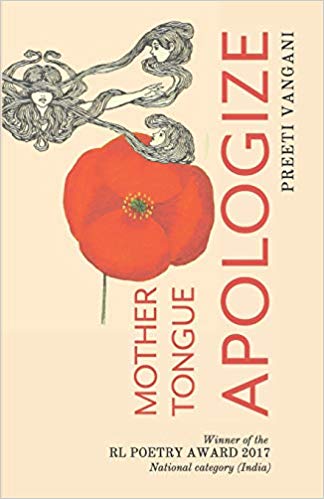Empowerment in Poetry: A Review of ‘Mother Tongue Apologize’ by Preeti Vangani
By Jules Henderson
Posted on

It was the esteemed poet and essayist Adrienne Rich who once said, “When a woman tells the truth she is creating the possibility for more truth around her.” We owe so much of our collective progress to individuals who offer us the truth, and in so doing, render their small corner of the world more genuine, authentic, and real. In her debut collection, Mother Tongue Apologize, Preeti Vangani wrangles the inner power to confront the loss of her mother, examine the construct of idealized femininity, and lift the veil that once hid centuries of unconscionable violence against women. In her words, she resides in truth and makes it possible for the world around her to follow suit.
Vangani’s writing is not only transparent but also relatable. She does not stand at a distance from the human experience, but rests calmly inside the eye of its storm and dares it to do its worst. In Why Poetry?, Matthew Zapruder argues that poems are arranged “as a kind of real-time movement of thinking, down the page, which the reader can enter, and follow” (Zapruder, 58). Vangani’s poetry is a testament to the merit of this claim, insofar as her writing is open and accessible—with each line serving as an entry point that guides the reader through the intricate landscape of her exquisite mind.
Her refined technique and mastery of craft permit her to spill her work outside the margin. She navigates the tides of loss and self-discovery through forms like the pantoum and ghazal, building fearlessly upon precepts laid out before her by poets like Elizabeth Bishop and Agha Shahid Ali. In poems like “I Chart” and “Autopsy Reports,” her form is reminiscent of Douglas Kearney’s Buck Studies in which he manipulates text and graphics and boldly scatters them across the page (seemingly with reckless abandon, though in reality, with meticulous precision).
Vangani brings a level of self-awareness and unshakeable confidence to her writing practice that yields a kind of liminal quality to her poems. She carries readers to a place between lift off and landing wherein we can observe, lament, return to the center, mend and heal, approach new perspectives, and awaken to the possibility of what we might become if we simply honored our own truth:
I curl tight in my fist all the versions of what I could be:
a history teacher, a saree folder, the sizzle of jeera
in ghee, the ruffle of pashmina sliding through a finger ring,
the inside of my mother’s palm.